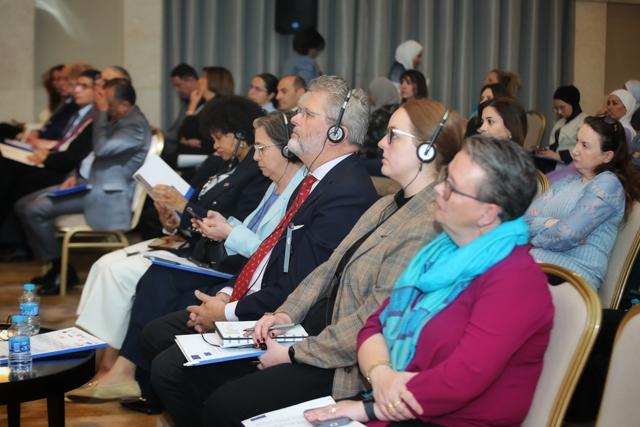AMMAN — The Spanish Agency for International Development Cooperation (AECID), in partnership with the European Union, UNFPA, and several Jordanian organisations, on Monday in Amman launched the third national awareness campaign titled “Her Life Without Violence, Her Future Without Fear”.
The campaign is part of the broader three-year initiative “No Silence, No Tolerance”, which focuses on combating gender-based violence (GBV) across Jordan.
It aims to improve awareness of available services for survivors, with a particular focus on reaching women and girls in host and refugee communities.
Speaking to The Jordan Times, Spanish Ambassador to Jordan Miguel de Lucas González said that the initiative runs from 2022 to 2025, with 4 million euros in funding from the European Union.
It currently operates in six governorates: Amman, Irbid, Zarqa, Karak, Tafileh and Aqaba.
So far, according to the ambassador, the campaign has reached over 10.67 million people through mass media, digital platforms and direct awareness sessions.
Around 87.6 per cent of those reached were women, while 12.5 per cent were men, the ambassador said.
More than 5,200 individuals have received direct support services, psychological, legal, and shelter assistance, with 85.4 per cent of them being women, including Jordanians, Syrians, and people from other nationalities.
“In Spain, we truly believe gender equality is one of the pillars of foreign policy,” said González.
He praised Jordan’s continued efforts in fighting violence against women and girls while stressing the need for continuous action. “This is a battle we must fight every day.”
The launch event was attended by several high-profile figures, including González, Mary Horvers from the EU Delegation to Jordan, UNFPA Representative in Jordan Himyar Abdulmoghni and Secretary-General of the Ministry of Social Development Barq Dmoor.
In his opening remarks, González highlighted Spain’s commitment to gender equality and praised the EU’s vital support in this field.
“Spain is very proud to have a feminist cooperation feminist cooperation, which prioritises gender equality and supports efforts to end violence against women and girls (VAWG).
He said that one in three women worldwide experiences some form of violence, physical, emotional or sexual violence in her lifetime.
In Jordan, over 25 per cent of women have reported experiencing violence, often from someone close to them, he added.
Horvers reaffirmed the EU’s dedication to ending GBV, stressing that the issue affects all communities, not just Jordanians, Syrians, or Palestinians. “Violence touches everyone.”
She expressed sadness that in 2025 there is still a need to have campaigns to raise awareness on all the negative impacts that violence has on women and girls worldwide.
Abdulmoghni, in his remarks, pointed to the findings of a national study on the economic cost of violence against women, which was completed in 2024 in collaboration with the Jordanian National Commission for Women.
The study revealed that only 5.2 per cent of GBV-related spending goes to prevention, awareness, and policy support, urging a stronger focus on early intervention and behavioural change.
Another joint study by UNFPA and AECID found that hearing success stories from survivors motivates others to seek help.
Abdulmoghni also highlighted government efforts, in partnership with national bodies and local institutions, in establishing comprehensive mechanisms for prevention, protection and support, which have shown progress.
“The 2023 Population and Family Health Survey indicates that help-seeking among survivors has increased to 34 per cent, up from 19 per cent in 2017–2018,” he said.
Dmoor underlined the ministry’s role in building a culture that refuses violence and supports women’s full integration into society.
In an interview with the Jordan Times, Regional Programme Manager of Euromed Feminist Initiative IFE-EFI Mais Afaneh pointed out a key issue: The lack of a comprehensive national system to track the full number of women affected by violence.
“Many women refrain from reporting on any cases of violence that they suffer from,” she said, adding: “Some don’t even realise they’re experiencing violence because there are several types and physical violence is the only one that is visible.”
Afaneh noted that violence goes beyond physical harm. It includes psychological, emotional, verbal and economic abuse. Her organisation has handled many cases where women are denied labour rights, inheritance or suffer abuse within the family or workplace.
She added that official data only captures a fraction of the issue. "Only 13 per cent of married women report abuse by their spouses”.
The launch conference brought together over 130 participants, including MPs, government institutions, embassies, civil society organisations, the media, community-based groups and universities.
